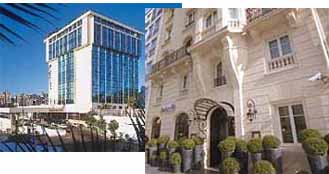
For almost two weeks the nights in parts of Paris and other cities in France have belonged to rioters, who seem intent on taking out parked cars (more than 6000 at last count) rather than fellow French citizens. Then tonite flames rose from three luxury hotels in Amman, Jordan with scores dead in the early reports. Although the blasts in Amman occurred in heavily touristed hotels, they are venues just as frequented by well-to-do Jordanians. In the Raddison a suicide bomber apparently set himself off in the midst of a Jordanian wedding.
These are not the first cities to blaze across television news programs, nor will they be the last. The images from New York, Madrid, Kabul, Baghdad, Fallujah, London are still fresh. The continuing carnage in Baghdad, with more deaths reported today, are understandable even if deplorable. But why Paris and why Amman? If events in these two cities have anything in common, it is the made-for-television spectacle and fodder for neocons who tout democracy and act as badly as tyrants.
France these past several nights has not become a new front in the War on Terror, in part because the French oppose the current coalition strategy in Iraq. leaders of the Muslim community, like those in Britain, condemn the acts of rash youth. But colonial sins are not so easily forgiven. To put down the disorder of angry young men with distinctly non-French names like Abdullah and Ali, the government of France dredged up public order laws from the dismal days of the Algerian war in which hundreds of thousands of Algerians died. After that war refugees swelled into France, welcome to work in low-paying jobs and drink French wine, but most were never quite accepted as French. It remains to be seen what King Abdullah (who with that given name might have a problem getting a decent job in Paris if he was not of royal birth) will do if more bombs go off. Will the low point in Jordanian history of Black September (when Palestinians expressed their frustation) be followed by a new Black November?
In the next few weeks no doubt several scenarios will be offered as to why Amman was targeted. Next to Iraq and in bed with the Americans: this is probably reason enough for such an attack. First of all, it would be easy to do. The porous border, which neither American nor Iraqi troops can successfully guard, has two-way traffic. Slipping into Jordan would be easier than trying to do damage in a stern police state like Syria, which would at any rate be an unlikely enemy of the insurgents in Iraq. Second, it would give the insurgency within Iraq a boost in morale, if that matters at this point of madness. In Iraq at present there is a motley crew of loosely organized groups and individuals against the American occupation and, more significantly, against each other. The daily death toll of American soldiers and those Iraqis who side with U.S. interests or just get in the way demonstrates that the defeat of Saddam Hussein has yet to turn into an American victory. We won the battle against the rogues on the infamous deck of Ba’athi cards, but we are losing the war for Iraqi public opinion. Setting off a bomb anywhere outside Iraq, whether or not it actually kills Americans, is a victory for anyone who has come to hate what American stands for. It is not democracy that they envy, certainly not one imposed.
Amman will recover; the shattered glass will be swept, hotel reservations will come back to normal in a few weeks, many of the injured may heal in time. But the wounds inflicted in France are likely to fester for some time. I suspect that the vast majority of Jordanians, no matter what their individual views of American foreign policy, would condemn these suicide-bombings in Jordanian public space. After all, why take out the Days Inn, when the Israeli embassy is just down the block? The same is true in France, where the public overwhelmingly disapproves of the violence, but still finds room to blame an inept government. The damage is France is self-inflicted, the implosion of a marginalized community in a society that treats some of its citizens like merde. Parked cars were targets in France because they were there and empty; the bomb-laden car that exploded ouside the Days Inn was a vehicle to kill as many people as possible. Two cities and two different sets of grievances. Two tales that remain to be told. And the ending is bound to be sad in both cases.
Daniel Martin Varisco